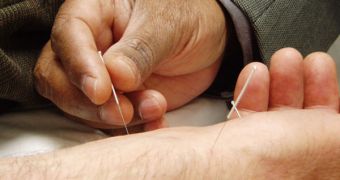Official statistics from the United Kingdom indicate that at least 20 percent of all patients have symptoms that cannot be identified or explained using Western medicine. For this group, acupuncture might be the best option, a new scientific study indicates.
Unexplained symptoms are a very widespread phenomenon, and they are a pain to deal with for both healthcare providers and patients. The latter stand most to lose, since they are stuck with their pains.
At the same time, documents indicate that treating these people costs the national healthcare system about twice as much, on average, than treating a patient whose diagnostics is known.
With the aim of helping this group in mind, researcher Dr. Charlotte Paterson, a Honorary University Fellow at the Peninsula College of Dentistry and Medicine, decided to conduct an investigation meant to determine whether acupuncture would help in this regard or not.
She selected about 80 patients from GP practices in London, and included five-element acupuncture sessions in their healthcare program, in addition to the therapies and medication already prescribed.
Eighty percent of study participants were females with an average age of 50. Details of the study are published in the latest issue of the British Journal of General Practice, PsychCentral reports. All test subjects were divided between two groups.
People in the first group got up to 12 sessions of acupuncture over 26 weeks of treatment. After the study, participants were asked to respond to a series of questionnaires, which included the “Measure Yourself Medical Outcome Profile” individualized health status questionnaire.
Patients said that their acupuncture sessions started to reduce symptoms such as chronic pain, fatigue and emotional problems, which had prevented them from functioning properly in society until then.
“The energy is the main thing I have noticed. You know, yeah, it’s marvelous! Where I was going out and cutting my grass, now I’m going out and cutting my neighbor’s after because he’s elderly,” one of the participants wrote.
“I had to reduce my medication. That’s the big help actually, because medication was giving me more trouble…side effects,” another added. When patients in the second group started their own acupuncture sessions, they showed marked improvements as well.
“Our research indicates that the addition of up to 12 five-element acupuncture consultations to the usual care experienced by the patients in the trial was feasible and acceptable and resulted in improved overall well-being that was sustained for up to a year,” Dr. Paterson says.
“This is the first trial to investigate the effectiveness of acupuncture treatment to those with unexplained symptoms, and the next development will be to carry out a cost-effectiveness study with a longer follow-up period,” she adds.
“While further studies are required, this particular study suggests that GPs may recommend a series of five-element acupuncture consultations to patients with unexplained symptoms as a safe and potentially effective intervention,” the investigator concludes.

 14 DAY TRIAL //
14 DAY TRIAL //